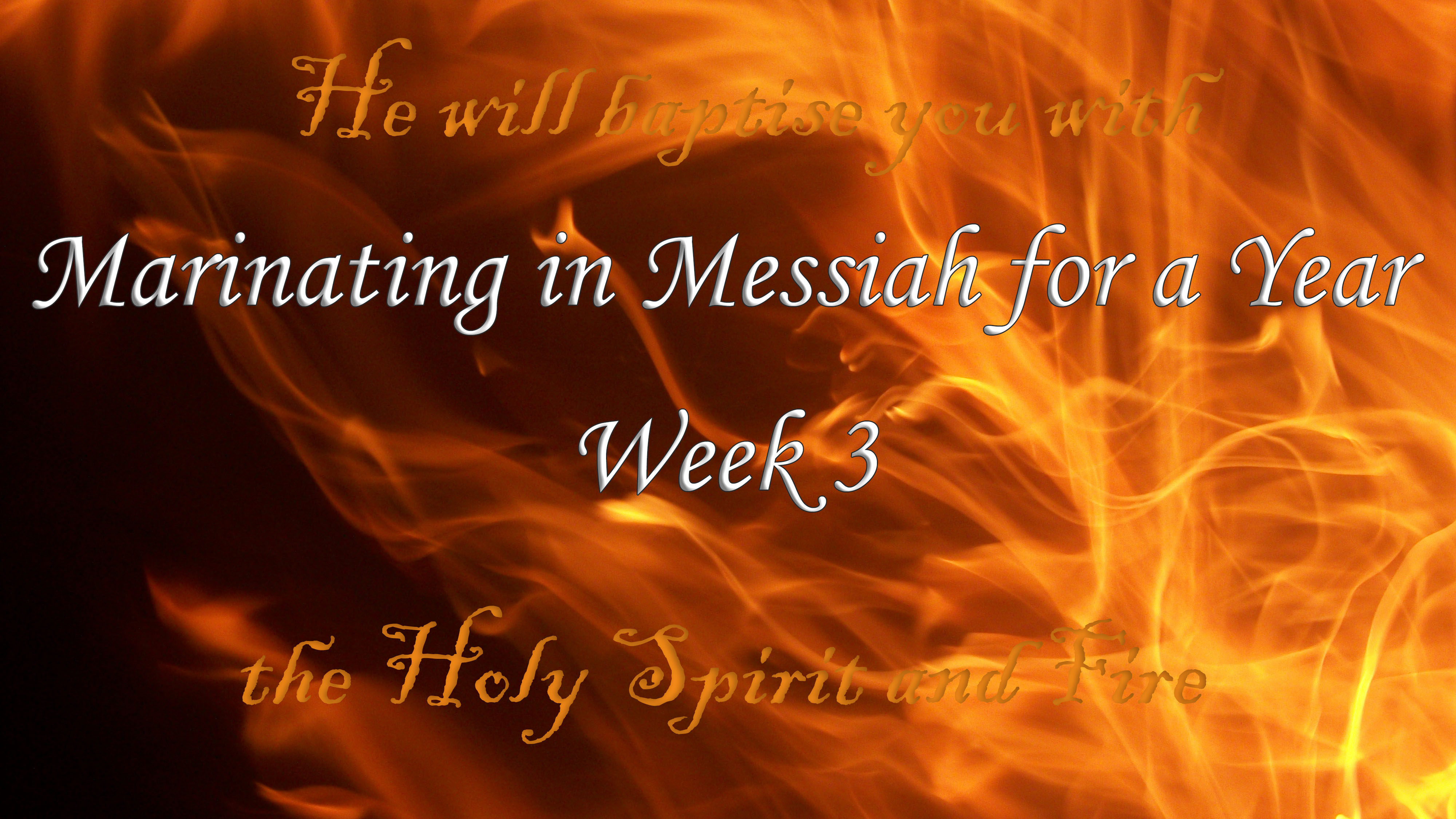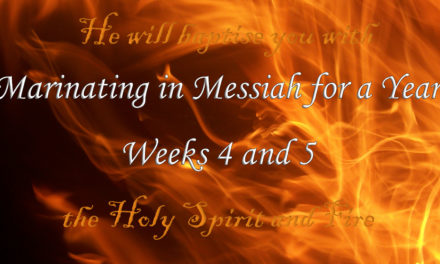 This week I spoke about something near and dear to my heart, namely the very destructive doctrine that says “Unless you are keeping all of the commandments, your prayers aren’t getting heard.” We know from Scripture that this is patently untrue, yet this heartless doctrine from one cherry-picked verse has had some unintended consequences. We also explored Messiah’s troublesome disciples, name it /claim it theology and the devastating impact on the special needs community, a defense of Paul, and the dangers of becoming obsessed with Torah study to the exclusion of Yeshua/Jesus. On a personal note, I shared a story of heartbreak from nineteen years ago.
This week I spoke about something near and dear to my heart, namely the very destructive doctrine that says “Unless you are keeping all of the commandments, your prayers aren’t getting heard.” We know from Scripture that this is patently untrue, yet this heartless doctrine from one cherry-picked verse has had some unintended consequences. We also explored Messiah’s troublesome disciples, name it /claim it theology and the devastating impact on the special needs community, a defense of Paul, and the dangers of becoming obsessed with Torah study to the exclusion of Yeshua/Jesus. On a personal note, I shared a story of heartbreak from nineteen years ago.
Marinating in Messiah for a Year–Day 15–Gal 3:5
Are our prayers really an abomination if we don’t keep every single commandment?
So then, the One who gives you the Ruach and works miracles among you—does He do it because of your deeds based on Torah or your hearing based on trust and faithfulness? (Gal 3:5, TLV)
There is an alarming teaching out there in some circles that misrepresents God’s character based on a misunderstanding of a proverb:
If one turns away his ear from hearing the law, even his prayer is an abomination. (Pro 28:9, ESV)
The heart of the teaching is this–that anyone who doesn’t obey any one of the commandments is “turning away his ear from hearing the law” and that their prayers are not heard by God and so any healings or whatever that they receive are not from God. This is a really dangerous doctrine, for a number of reasons.
One, there is a big difference between someone who turns their ear away from hearing God’s commandments, and someone who in the integrity of their heart has been trained to see some of the commandments as no longer for today. In such a person’s mind, they are not breaking any commandments. Their conscience is clear. If they are guilty of anything, it is being blinded in an area–as are we all if we want to be honest.
Two, none of us are keeping all of God’s commandments. If you have no parapet all the way around your roof–are your prayers an abomination? If you have a toilet in your home instead of walking outside the camp, shovel in hand, are your prayers an abomination? If brother in laws aren’t marrying their childless dead brother’s wife? If all males don’t go to Jerusalem three times a year…you get the drift. We can come up with reasons why we don’t do those things–valid reasons in our day and age–but are those reasons any more valid than the reason of people actually not being aware that they are breaking a commandment? We have reasoned away keeping a law, so are we any different than anyone else? Why do we give ourselves a big fat pass while condemning others?
Three, in Matthew 12, we see Messiah working a great miracle of delivering the mute and deaf man from demonic torment. Being unable to deny the miracle, the Pharisees start questioning the source of the deliverance. They say it isn’t by the power of God that Yeshua performed His miracle, but by the power of Beelzebul (the KJV mistranslates this as Beelzebub based on their Latin source material, completely bypassing a really interesting insult), and Yeshua immediately rebukes them and warns about the dangers of blaspheming (slandering) the Holy Spirit. In an attempt to say, “Sure, he performed a miracle, but not authorized by the Spirit of God,” they found themselves attributing a great sign to hasatan, the adversary, instead.
This is the dangerous ground we walk when we limit the love and generosity of God towards His people through legalistic interpretations of the Word, especially any single cherry-picked verse and especially a proverb when many of them directly contradict one another (ie. should we rebuke a fool or not?). Taking one proverb which applied to a generation who were raised with God’s laws as their constitution, the very fabric of their society, and even then only to people who knew and were able to culturally keep every aspect of the commandments and willfully refused to do so and then applying that to our generation–we leave ourselves literally “without a prayer” whenever we fail to keep even a single commandment. If their failure to keep a commandment is to be equated with turning their ears away from hearing the law, then how much less without excuse are we who claim to be guides to the blind and yet are transgressors ourselves?
“Oh, when we do it, it is okay because…” Oh really? That’s some conveniently selective mercy we are preaching there…
Truth is, that God is merciful and hears our prayers regardless of our current state of blindness. As He heard the prayers of David who had a teraph (idol) in his bedroom (I Sam 19:13) big enough to masquerade as a man in bed, so He hears our prayers when we, through blindness, ignorance or cultural accommodations, do not keep every single one of the commandments. We have to remember the goodness that God has generously poured out on ourselves time and time again–do we attribute the miracles in our own lives to Beelzebul? Or just those performed in the lives of others? We are none of us Torah-observant, not one of us. Although we might keep a few more commandments than someone else, or just different ones than they do, we must not fool ourselves because we do turn a blind eye to those commandments that are inconvenient or impossible, or even illegal to perform in our day and age.
This is where the “trust and faithfulness” part of Gal 3:5 comes in. If we interpret Proverbs 28:9 as some do, then none of us are receiving miracles, and deliverances in response to prayer from God. Not one of us. We have all turned aside for one reason or another. We have to trust in God’s goodness despite this and credit Him when goodness comes to us. If we do not, then we run the risk of attributing God’s merciful works in our lives to the evil one. Do we dare even go there after the Savior’s warning to the Pharisees who were nitpicking Him while they had their own workarounds that prevented them from keeping all of God’s commandments?
Let’s not forget the words of Yeshua to the man He healed at the Bethsaida pool:
Afterward, Jesus found the man at the temple and said to him, “See, you have been made well. Stop sinning, or something worse may happen to you.” (John 5:14, BSB)
God hears the prayers of sinners. God works miracles for sinners. Good thing too, or He would be too disgusted to turn His ear to our prayers with as ridiculous, unmerciful, ungrateful and presumptuous as we are. Ungrateful and presumptuous? Yes, of course, what else should we call it when we ignore the clear warning of Gal 3:5 and attribute our miracles received to our observance of the commandments–and in so doing make them earned rewards instead of gifts bestowed upon our terminally unworthy selves.
And that is why we can trust Him–because He is bigger than the legalistic misinterpretation of a proverb.
Marinating in Messiah for a Year–Day 16–Ro 8:17
Did you ever notice that Yeshua’s/Jesus’s disciples were all too often at odds with Him?
I was rereading Richard Horsley’s Jesus and Empire and he made that comment, about how it was a consistent theme of the Gospels. It really struck me, that Yeshua was teaching and leading a bunch of men who were at cross-purposes with Him.
They wanted power and authority, while He wanted them to be servants.
They wanted to call down fire from heaven against those who rejected them, while He came to save those very people.
They didn’t want Him to die, while that was why He came.
They believed they were following Him, but in some ways all they were doing was listening to His teachings and traveling with Him. They really didn’t get it. They thought they were following the Lion of Judah who would physically conquer the enemies of Israel and return the Kingdom to them–and they thought they would have places of authority and honor, even over one another. They wanted to nuke the Samaritans for refusing to receive them. They didn’t want it all to end in intra-Jewish bloodshed before Yeshua could amass a peasant revolt, finally overturning Roman rule and ending the exile that kept them as virtual slaves within their own borders. They wanted the Lion who destroys, while He came as the suffering Lamb.
They honestly thought they were acting in His best interests, when they were actually at cross-purposes with Him–and acting in their own flesh. It was their own interests that they pursued, their own future positions of power that they were jockeying for, and their own hatred that they were nursing.
And they could heal the sick, raise the dead, cleanse lepers, and deliver people from demonic bondage (Matt 10:8)
I want that to really sink in. They had signs and wonders at their disposal, and the message of the Kingdom, but they weren’t living it. They still weren’t getting it, however much they preached it.
After His resurrection, in Matthew 28:9 and Acts 1:8, He told them to preach to the ends of the earth–specifically told them to teach the nations (the Gentiles) but it took persecution at home by the hand of Saul (later Paul) to even get them to leave Jerusalem. And this was after the big outpouring of the Spirit (as opposed to the minor outpouring they received that gave them the authority to work miracles). Even after Peter’s wake-up call, he still drew back from table fellowship with the Gentile converts in Galatia. So did Barnabus.
So here’s the point.
Are we also at odds with our Savior? If they, of all people, were so clueless before and after the resurrection, can we afford to be so sure of ourselves?
Here’s the other point.
Imagine the patience required to put up with all of this nonsense from all of us. We still want the Lion of Judah, right now, but we are still living in the times of the Lamb of God, who suffered and is also calling us to suffering.
And if children, also heirs—heirs of God and joint-heirs with Messiah—if indeed we suffer with Him so that we may also be glorified with Him. (Ro 8:17, TLV)
Staggering.
Marinating in Messiah for a Year–Day 18–Eph 3:12
There is a huge difference between “naming and claiming” and humbly praying with hope in our hearts. We need to come to see prayer as an opportunity.
…in (Messiah) whom we have boldness and access with confidence through our faith in him. (Eph 3:12, ESV)
I want to hit this again since people have been asking questions lately. As many special needs parents are prone to do, and indeed people in crisis situations in general, over the years I had grown very cynical in my prayers, despite having seen miracles in my life. It is a terrible burden to be a believer in a world where sickness and infirmity is regarded by the perennially healthy automatically as a curse, or a sign of unresolved sin, or some other such nonsense. There are people around whom it is not safe to partake in the sufferings of Christ that we hear so much about.
They tell us that if we had enough faith, we could cure our kids–or ourselves, through prayer and so we pray and pray and pray. Believe me, almost no one prays like the mom of a disabled child. Not praying isn’t the problem! Nor is our unresolved sin, or else prostitutes would never give birth to healthy children, right? But folks don’t really think it through, and so parents who are already exhausted and heartbroken get to feel humiliated by certain elements in the Body as well. A true case of adding insult to injury, and the antithesis of the compassion and encouragement that is supposed to flow to us through the sufferings of Messiah.
…who comforts us in all our affliction, so that we may be able to comfort those who are in any affliction, with the comfort with which we ourselves are comforted by God. For as we share abundantly in Christ’s sufferings, so through Christ we share abundantly in comfort too. (2 Cor 1:4-5, ESV)
So anyway, we who are already in a sense afflicted have to endure treatment that causes us, quite without our awareness, to become cynical and bitter in prayer. Cynical because we can no longer bear to hope day by day only to have our hopes crushed, and bitter because we have searched high and low for sin, and we have done everything we were told would work–generally by people who suffer no such afflictions themselves and are just passing on what they have heard. They live believing that their health is proof of their goodness when in reality their health is quite possibly a test of compassion and gratitude that they are failing miserably.
When God showed me my cynicism and bitterness in prayer, I was floored. I hadn’t always been that way, but false and presumptuous expectations had made me into this person who prayed without hope, out of a sense of obligation, because I felt I needed to pray in order to be a good mom even though I was overcome with the grief that my prayers on behalf of my beloved son seemed to go unanswered (in the affirmative) day after day after day.
Hope deferred makes the heart sick, but a desire fulfilled is a tree of life. (Pro 13:12, ESV)
That verse is the reason why special needs families (whether due to disability or chronic illness) know both lows and highs that most people cannot imagine. No parent knows happiness like the parent of a child who has been tested cancer free, or (like me) has seen their child walk, run, and skip who was never supposed to be able to stand without leg braces or any number of other huge victories that are just normal facts of life for most.
But when the Spirit impressed upon me the truth of what my prayers had slowly become over so many years, namely bitter and cynical, there was also relief and rescue. I finally came to understand prayer.
Prayer is not what the prosperity preachers and their disciples teach–namely an opportunity to claim blessings that we feel as though we deserve (when clearly we don’t even deserve eternal life but are getting that anyway through the goodness of Yeshua/Jesus). Prayer is an opportunity.
I want to repeat that. Prayer is an opportunity. An astounding opportunity. We live in a world where the lost greatly outnumber the saved. Less than a third of humanity knows and has accepted the Gospel of the Kingdom through the testimony of our Savior. The prayers of the lost towards their gods, our God may hear them but He doesn’t actively turn His ear to those prayers. We are different, whether we really realize it or not.
Yeshua took us from people praying in a sort of random way to who knows what and who, to people with access to the throne of the One True God of Abraham, Issac, and Jacob. We have access to the throne of the King of the Universe who owes us nothing, and from whom everything is an unearned and undeserved gift, even each breath. Yet, Yeshua saved us through our belief of the most insane story ever told. We actually believed that the Creator of the universe would send His own beloved Divine Son, with Him from before the Creation of the world to live among us, showing His own character when we really weren’t getting it–to die on our behalf so that we wouldn’t have to face permanent death separated from Him. That’s an insane story, and would require us to believe in an impossible sort of love that is just beyond our comprehension.
But that insane story also needs to come with an awareness that we have already been given everything that we never deserved–the world to come aka eternal life. Anything else is a bountiful gift, relatively nothing in comparison. We need to start praying with that understanding, that we have already had our cups filled to overflowing, no matter how badly damaged we are, or our loved ones are. We want more because we love them and ourselves, we do, but we err when we listen to those who equate receiving divine healing and general good health with automatically having God’s particular favor.
Are we really to believe that God has no regard for people with Down Syndrome or Cerebral Palsy, but only for those born healthy? Yeshua told us that we would be judged based upon how we treat such people–sounds like they are specially beloved to me (Matt 25:31-46). And it sounds like the rest of us are the ones being judged, and not them.
That our prayers are heard at all is a miracle, that we have access to even be heard in such a place. That we, who have been given so much, are given permission through our faith in Yeshua, to ask for even more. It’s mind-boggling. That’s why we have hope–not because we are promised what we are asking for, but because we have been given permission and even encouragement to ask. Being able to ask gives us hope.
Think of a King behind insurmountable walls with no gates. He has made himself completely inaccessible, except to those born inside the walls. When Yeshua died for those of us outside of the Covenant, bringing us into the Covenant, He made the outsiders insiders, and blew a hole in the impenetrable wall. Now we can come in and have access to ask for the fulfillment of our righteous desires–all we had to do was enter by the way He made. Scaling the wall or trying to enter illegally would never have gained us the ear of the King–but when the Son lets you in, you get heard.
It’s as though someone would come to us saying, “I know and love your son..” –wouldn’t they have our attention?
That doesn’t mean we receive every petition, or even most of them, but it does mean that we (unlike most of the world) get the opportunity to ask. And so we can hope that we will get what we ask for, someday, instead of having to live in despair. But every new day is a chance to petition the King anew, hoping that today will be the day.
Marinating in Messiah for a Year–Day 19–the Epistles
In defense of our brother Paul.
We’ve been reading Paul primarily for the wrong reasons. It is a mistake to read Paul only to prove the Law is done away with. It is also wrong to read Paul only to prove the Law is still in effect. It is also wrong to read Paul only to focus on conquering and understanding the confusing passages.
So how should the overwhelming majority of us read Paul? We should approach him as a Jewish brother in Messiah who went out into the world of pagan gentiles and had to diligently teach them to live Biblically, how to love one another in radical new ways, and how to live faithfully by new standards that were almost completely at odds with everything they had always known.
If we read Paul in that way, we will become better conformed to the image of Messiah, as his writings are incredibly damaging to our flesh and if anyone is entirely comfortable about who they are and how they behave towards others while reading him, they aren’t looking hard enough.
Paul, unlike the other disciples, knew that you could keep all the laws according to even the strictest standards and still be deplorable on the inside–and that it would manifest itself on the outside sooner or later. As such, he knew the dangers of leading the former pagans into a solely works based system of observance. He had to teach them how to be God-fearing not only on the outside but on the inside.
If we will allow it, he will also teach us as well. But if we attack Paul’s writings as though they are an obstacle or a tool to promote any other agenda than how to become radically loving image-bearers, then we are really missing what is most valuable about Paul.
I guess I would summarize it like this–if we are using Paul to justify ourselves, if we are using any part of the Bible for self-justification, then I think our focus is off. We shouldn’t even have a focus of living defensively like that, as long as our consciences are clear. Paul is there to teach us how to be better ambassadors of our King, not how to be right in an argument, or look clever, or to beat in someone else’s brains with what we think we have figured out.
Marinating in Messiah for a Year–Day 20
This is my saddest day of the year. It is always really hard for me. My first baby was due 19 years ago today, but I spent it mourning the loss of my third baby a few days earlier.
This was also the day I was baptized by the Holy Spirit, right there in my room as I was insane with grief. I imagine God saved my life that day. I laid on the floor, just inconsolable, having been a Christian for just barely over a year. I wanted to die. I felt like a murderer, like my body was killing my babies. Not on purpose, of course, but I felt like I had failed my precious little ones. Everything was supposed to be so simple. I didn’t know that my womb was misshapen, that I didn’t make more than a few days worth of pregnancy hormones a month, and that I had a scoliosis centered around the vertebrae that housed the nerves that connected my spine to my reproductive system. But even with correcting what we could, it would never be enough in the future to save any of my other pregnancies.
I laid there on the floor. Near suicidal. Wanting to die more than I wanted anything other than my children. I choked out the most difficult prayer of my life.
“God, if it is not Your will for me to be a mother, I can accept it, but I have to know or I will die. I am dying.”
It was then that I felt the Holy Spirit come down on me in power and I prophesied. There would be children, but never of my own body. I still mourned, but I lived. I had hope, even in the depths of my grief.
My beloved sons whom we adopted will be 18 in March, and I wouldn’t trade them for the world. I would die a thousand deaths for them. But it doesn’t mean that I don’t miss the babies that I never held. It doesn’t mean that they weren’t real, or that I didn’t love them. I still feel the loss to this day and probably always will. I love them, I loved them all from the moment I realized I was pregnant–and I would have given my own life if even one of them could have survived. Been thinking about this all day but couldn’t even write it down until now.
Marinating in Messiah for a Year–Day 21
I think I know why some people become so obsessed with Torah to the neglect of Yeshua/Jesus. It’s actually the same reason why some people prefer Paul to Messiah. Please hold back any pitchfork and torch action and hear me out. I am very much preaching from my own experiences here.
I mean, anyone who has been around the HRM (Hebrew Roots Movement) or Messianic Judaism long enough will know someone who has ditched Messiah altogether in order to convert to Judaism, but I never really understood why it happened until I started focusing so much on the Gospels about nine months ago with deep studies into Matthew. (and this is not a forum for bashing the HRM, MJ, or the rest of Christianity in general)
I mean, at first people become engrossed in Torah because it is largely neglected in churches and we feel that we have been deprived of it and that explains the first couple of years where we behave in a largely insufferable fashion–but after that, many still don’t go back and revisit the Gospels with the same passion that they exhibit when they dive into and defend the Torah. We see a lot of problems with families where the kids just never get a glance at the Savior and what He actually taught, said and did, except to show where He can be found in the Torah, in order to justify the study of Torah–we forget how we benefitted from all those years focusing only on the One who gave His life so that we could have eternal life. As we didn’t have the Torah as foundation in order to build upon it with Yeshua, they don’t have the foundational knowledge of Yeshua to give the Torah meaning.
But anyway. Focusing on the Gospels and Epistles, I see how hard they are to read for anyone who has gotten used to the Torah for a very disturbing reason–Torah is doable whereas the standard set in the Gospels and Epistles is most decidedly not something we will ever achieve. The Gospels and Epistles, for all the hope imparted, leave us terminally humbled. And just when we were feeling so proud for having “figured out” this Torah stuff.
The way most people read Torah, as a series of regulations by which we show our allegiance to God, and which really aren’t that difficult to keep at first glance or at a plain text level, give us the idea that we really can be perfect if we just do X, Y, and Z. We can be better than others, who some now label as rebellious pagans, by virtue of the commandments. We can eat clean. We can practice keeping the Feasts. We can take the seventh day Sabbath off of work. Men can wear tassels. We can put a mezuzah up on the doorpost. Not really very difficult, as long as we have an amenable work schedule and enough vacation days. We can observe those rules even while being rotten, horrible, vermicious knids. We can look down on the people who aren’t observing those rules according to our standards. The Torah gives us a way to artificially be “better than” and “more obedient than” others who might be working their little tails off feeding the poor, doing missions work, and volunteering in hospitals and such.
Oh, but then Messiah had to come and torpedo our flimsy little boat of self-righteousness. “It’s good that you are doing those things, BUT…” oh those terrible buts, and our collective but has grown obese, “BUT…you’re missing it. You don’t have love and charity and justice flowing from your heart. You aren’t actually getting nekkid and committing adultery, but you are looking at that gal and thinking about “what if.” You divorced your wife when no indecency was found in her and used Moses as an excuse to do it. You don’t commit murder, but you sure love to slander and accuse people, and hate them in your heart.”
Yes, of course, we hate people. I can admit it. There was a time when I actually couldn’t admit it without justifying it with my very next breath. For many years, I was a believer AND I lusted. There were years where I cared not a fig for the lost–I only cared about bringing people over to my way of thinking, as though I could convert people who were already converted. Oh, and I could tell you worse than that, but you get the drift.
It isn’t Torah that challenged that type of thinking, except with a few vague references to loving your neighbor and circumcising the heart in the midst of all the do’s and don’ts that outline basic eternal standards of decent behavior towards one another. It’s Yeshua. It’s Jesus. Jesus tells us that conforming on the outside is a sham if we are still self-congratulating villains on the inside, and no one keeping the rules can stomach being labeled a villain. How like the Pharisees we are!
It’s the same reason why some of the people who believe that the commandments are no longer for today (even though mainstream Christians keep almost all that can still be kept, so they really don’t believe what they were taught that they believe–it’s just a mantra) like to skim through Paul and neglect the actual hard-core teachings of the Savior. Their version of Paul (as long as you skip those passages where he condemns gossip, slander, envy, jealousy, outbursts of anger, being divisive over side issues, etc) tells them exactly what a focus on Torah tells some people–that they are okay. There really isn’t that much of a difference between people who think they are okay because they keep rules from people who think they are okay because they believe in certain things without having to obey. Jesus was huge on the importance of obedience, but He stressed that it had to be inside and out, a heart change issue.
In other words, a person can change their behavior to externally keep the Torah laws, but only a changed person can hope to honor them inside and out, in spirit and in truth, in thought as well as action. No one wanted to hear that. Paul teaches the same thing, and no one who believes they can be perfect through eternal law-keeping wants to really hear that either.
And so, on the extremes of this situation, we get people falling away–on one hand, we have people falling away and denying Messiah, and on the other hand we have people falling away into gross sin and rebellion. Most people don’t go either route, but we still tend to be an unbalanced lot for the exact same reason–we don’t really want to hear the message of the Savior and Paul, that He died in order to remake us into new creations who could keep the commandments not as external rules, but as reflections of a changed heart.
But that’s exactly why Yeshua is the light of the world, shining light into the darkest and most deceptive place on earth–our heart.





















